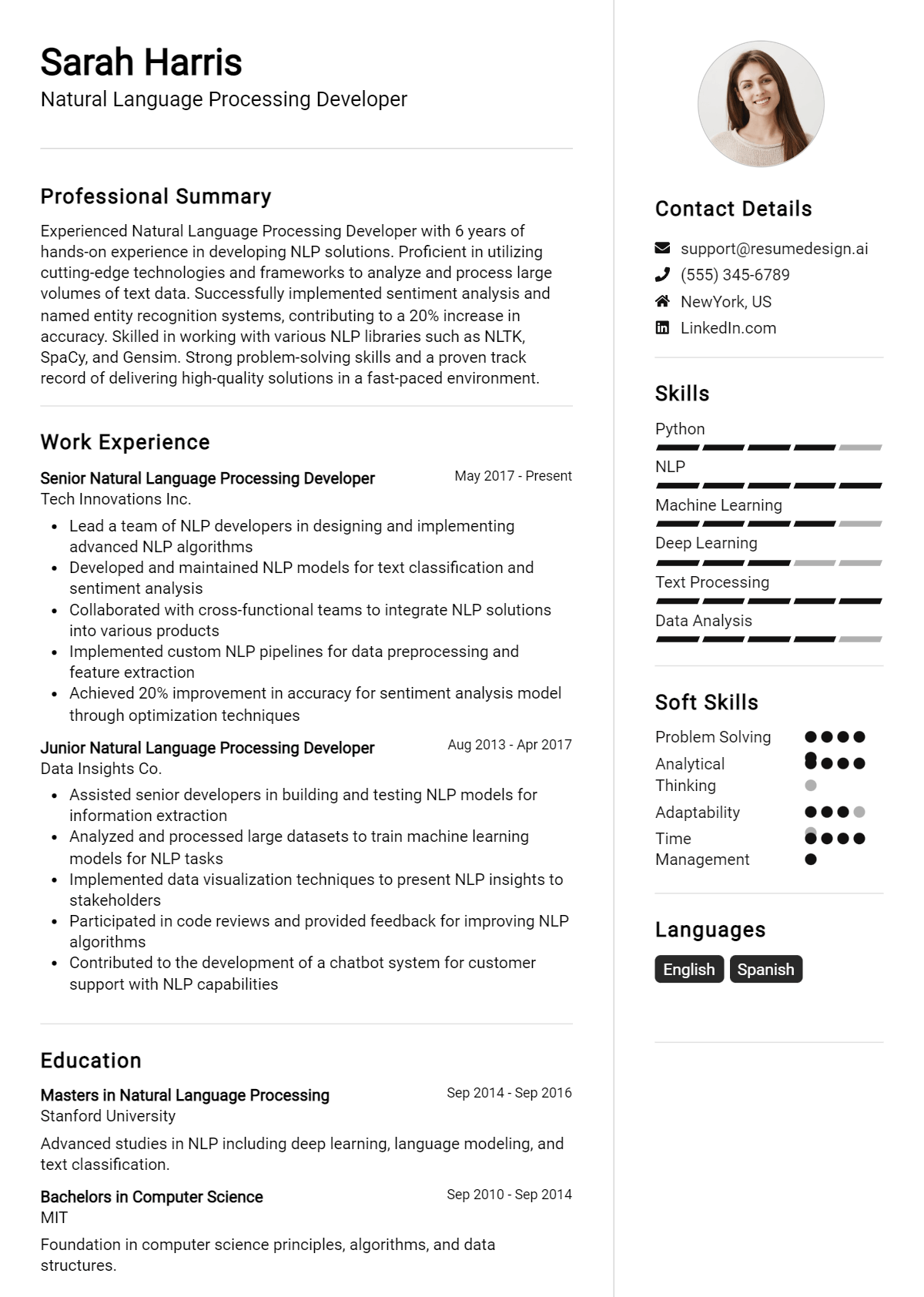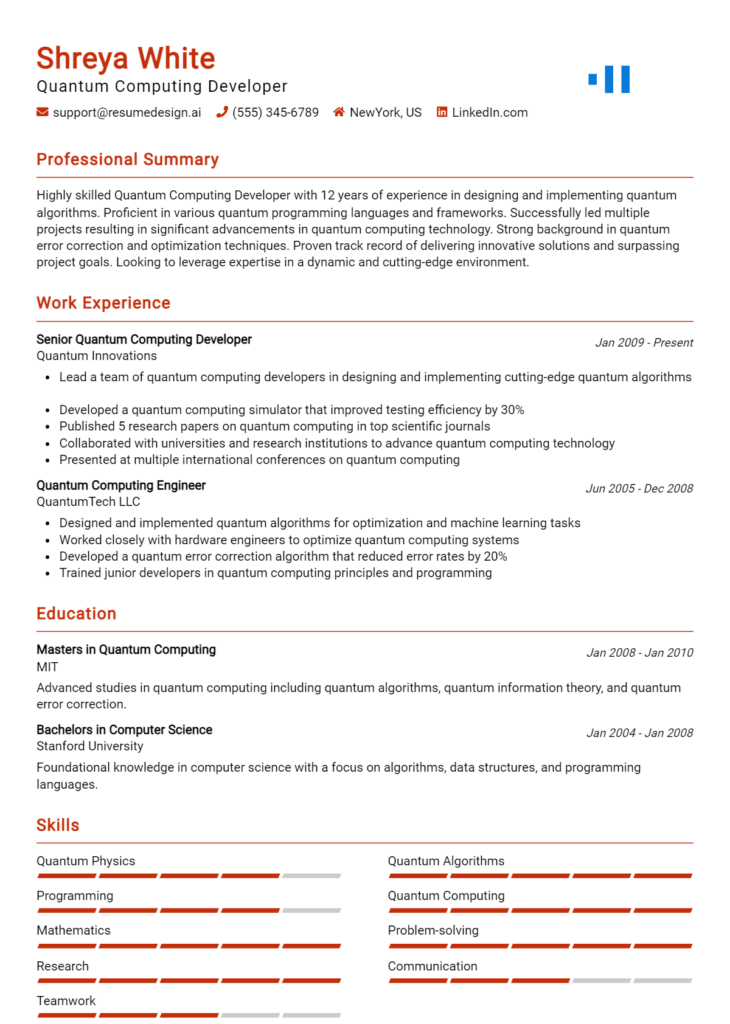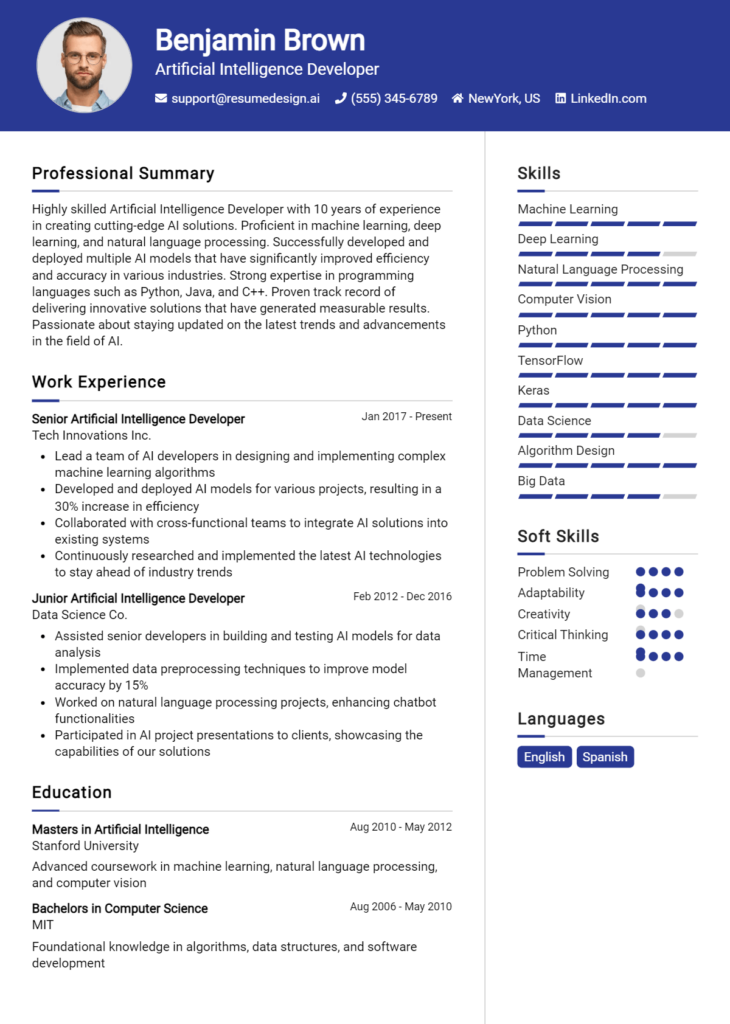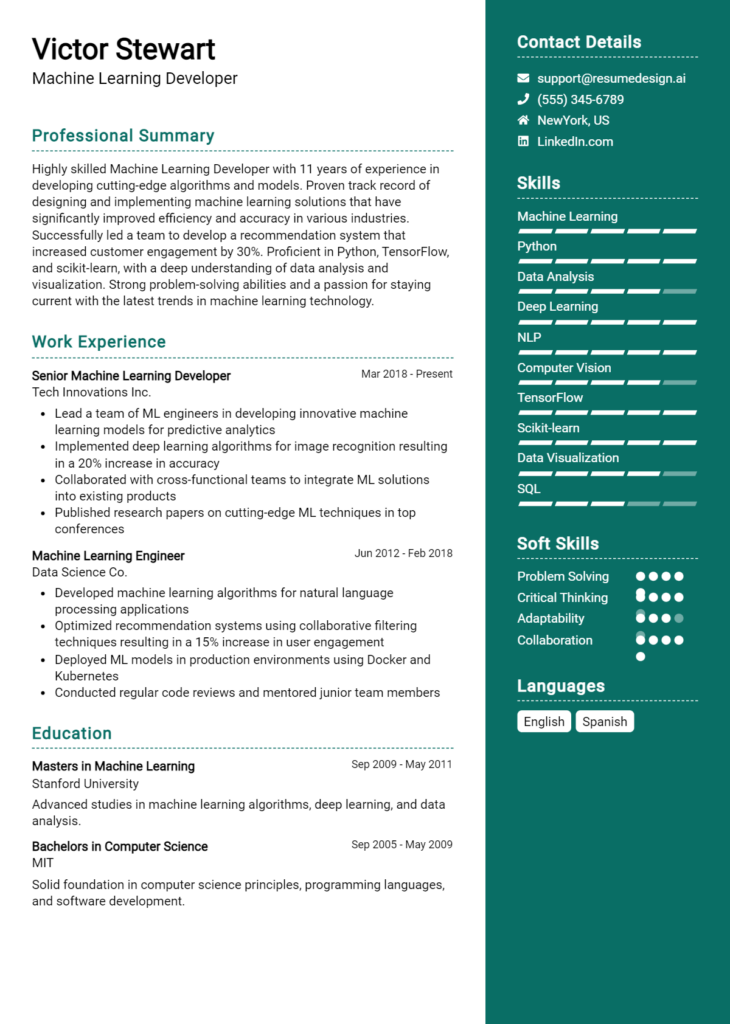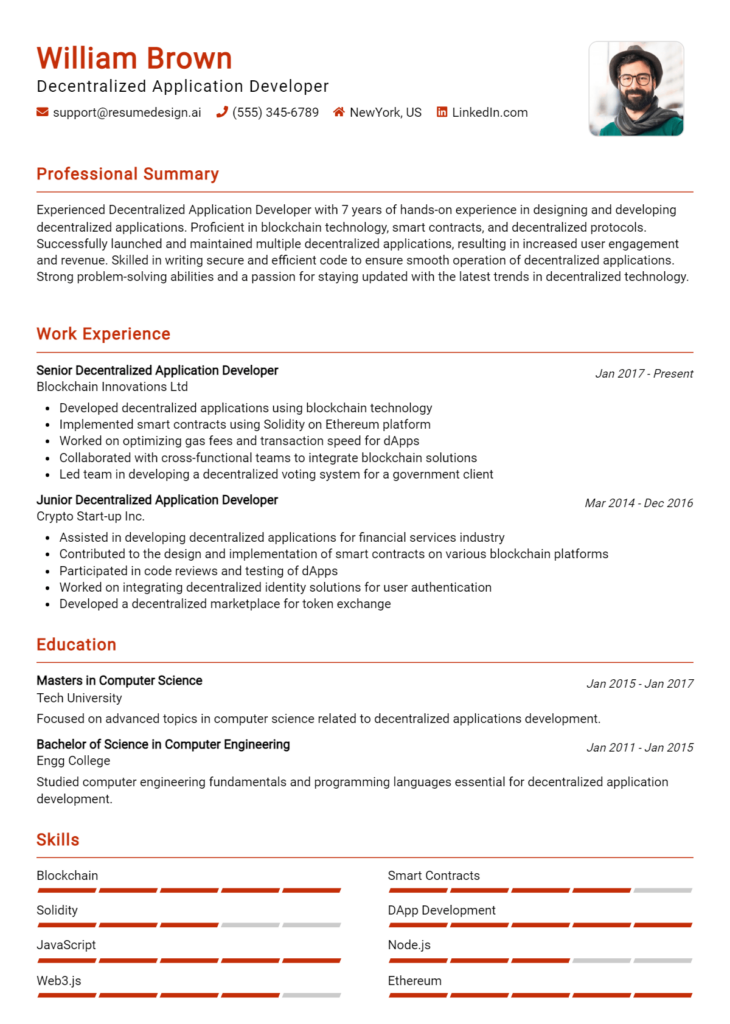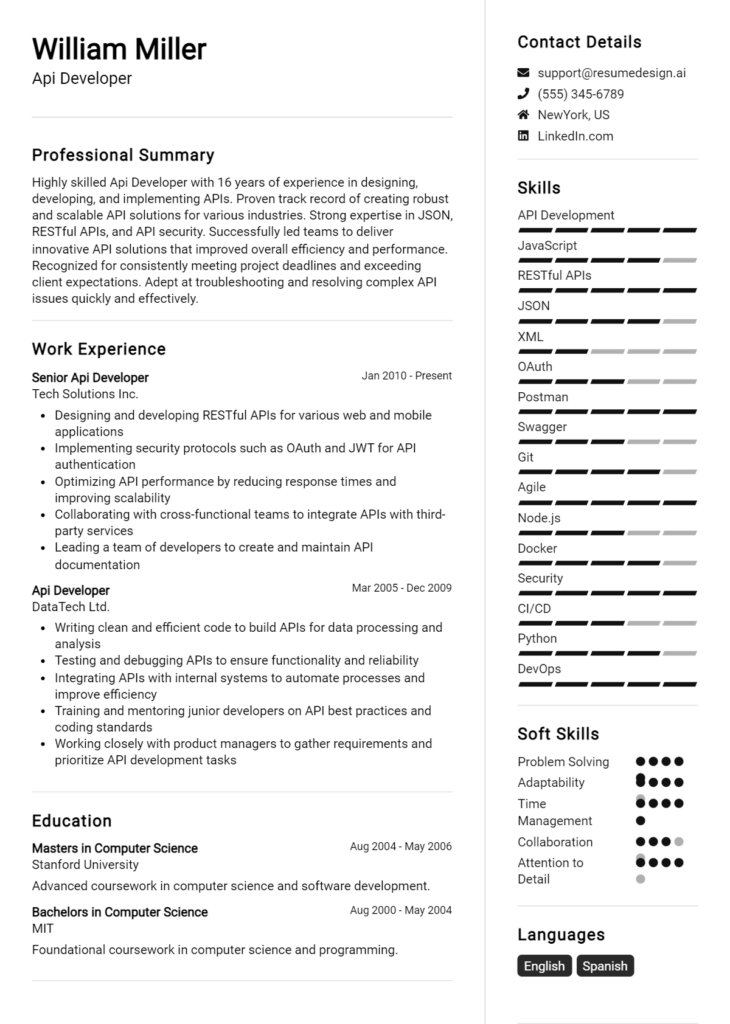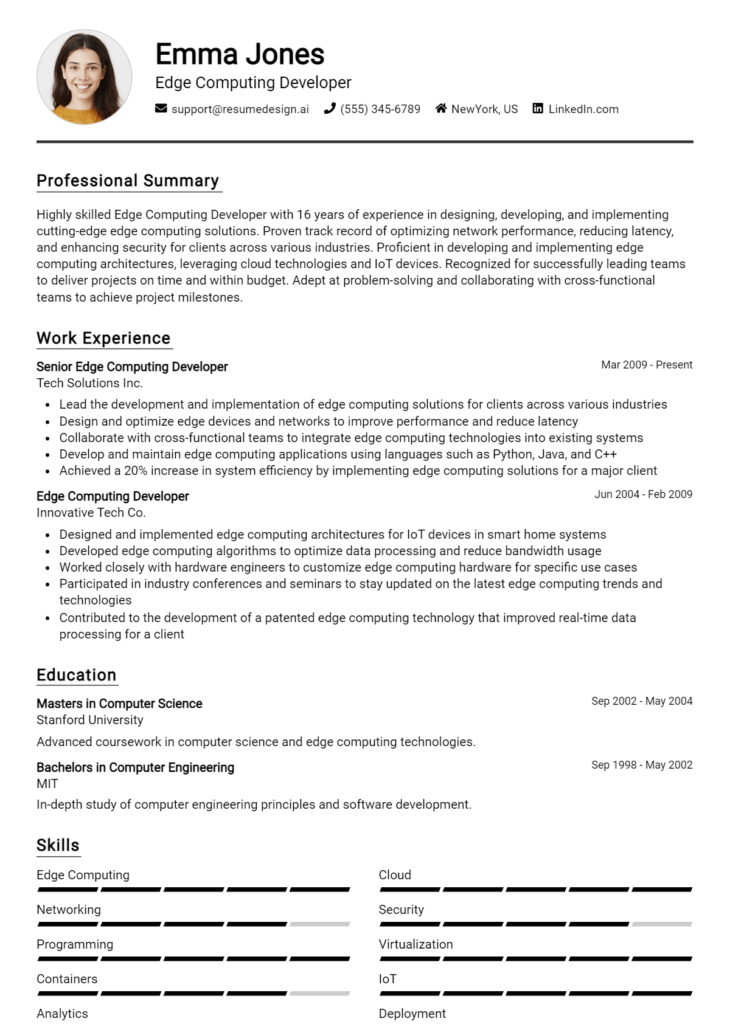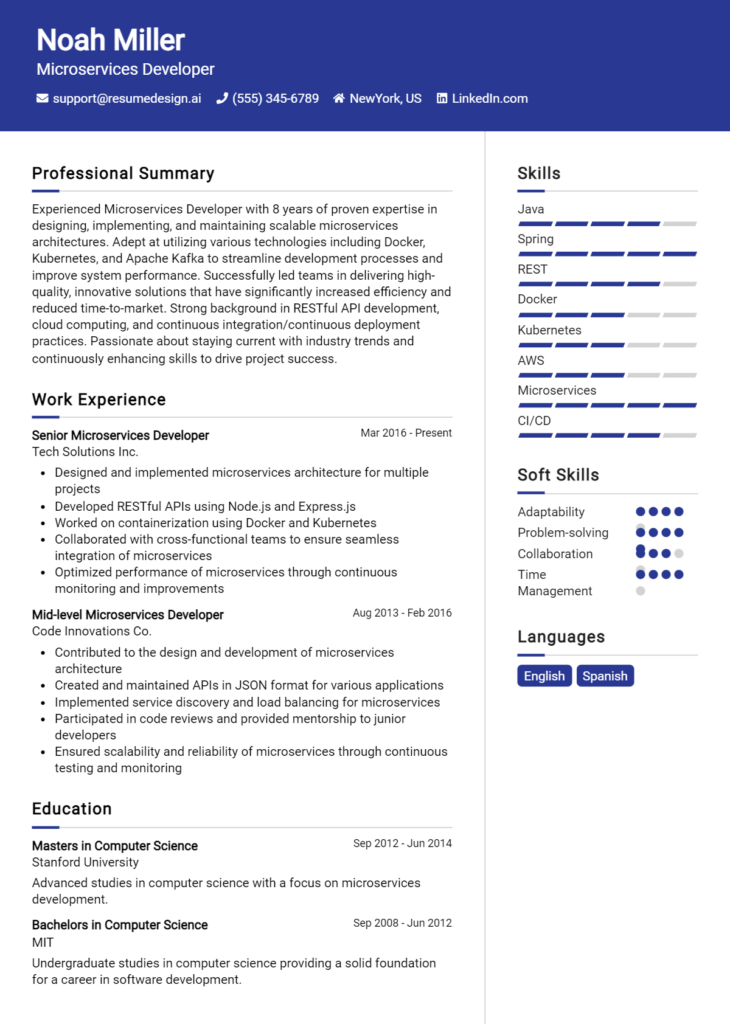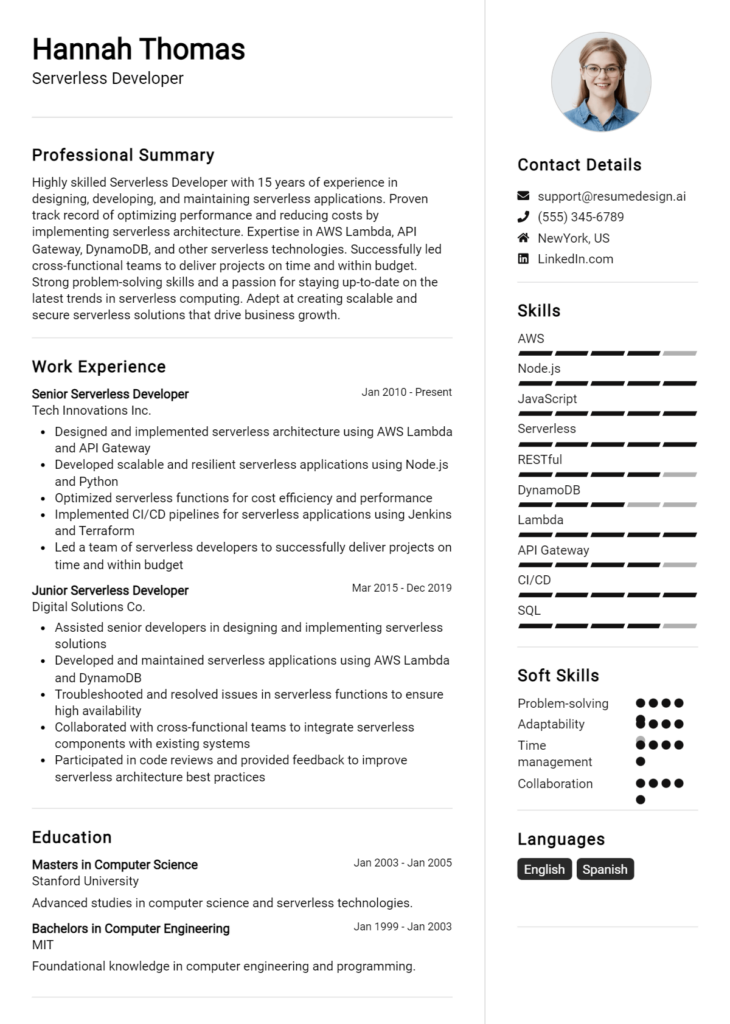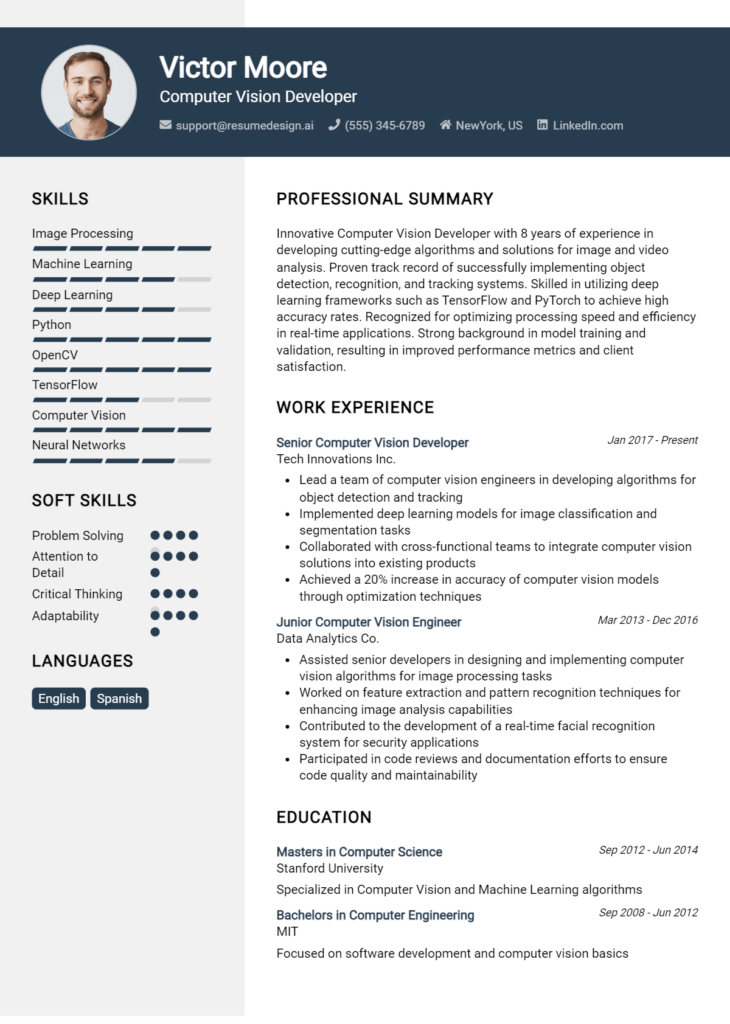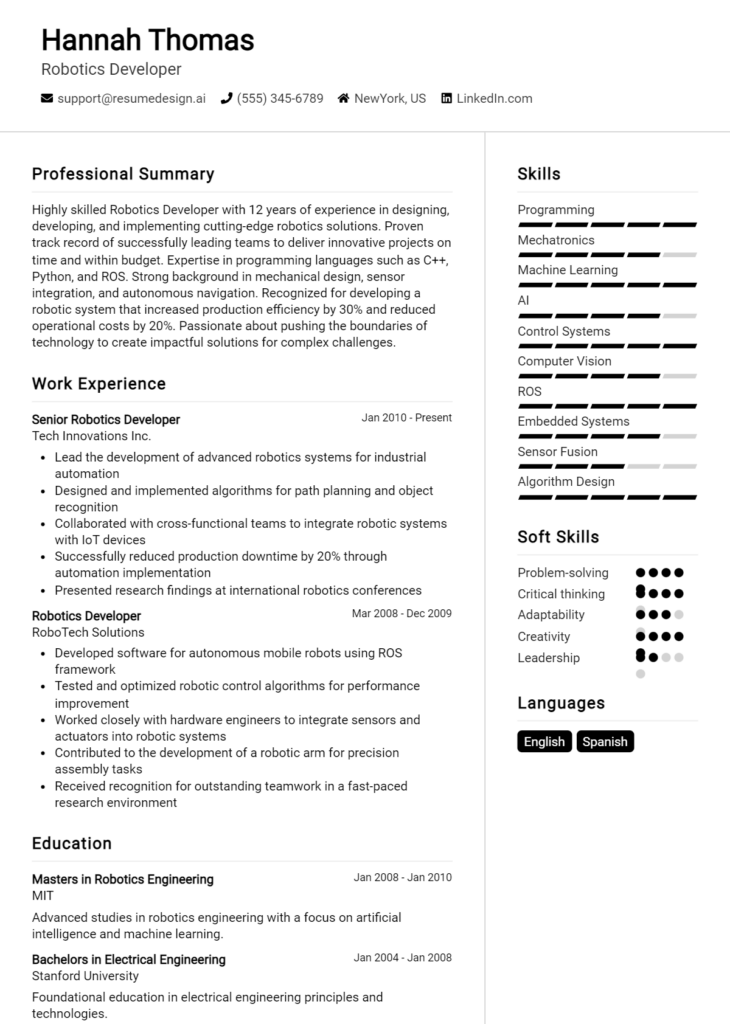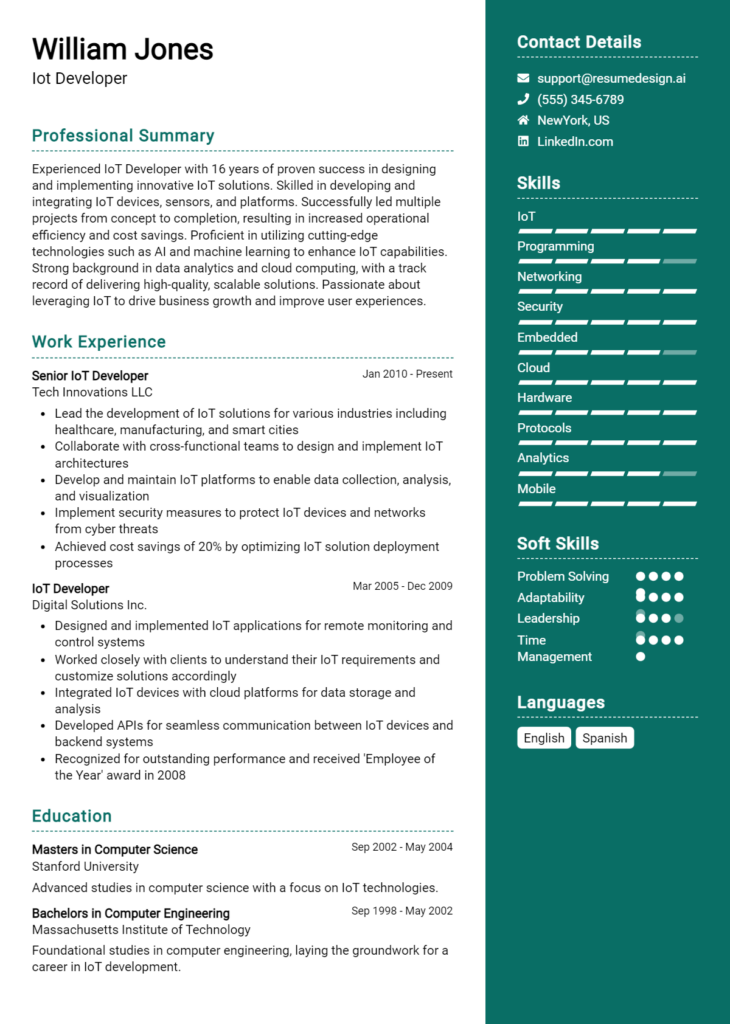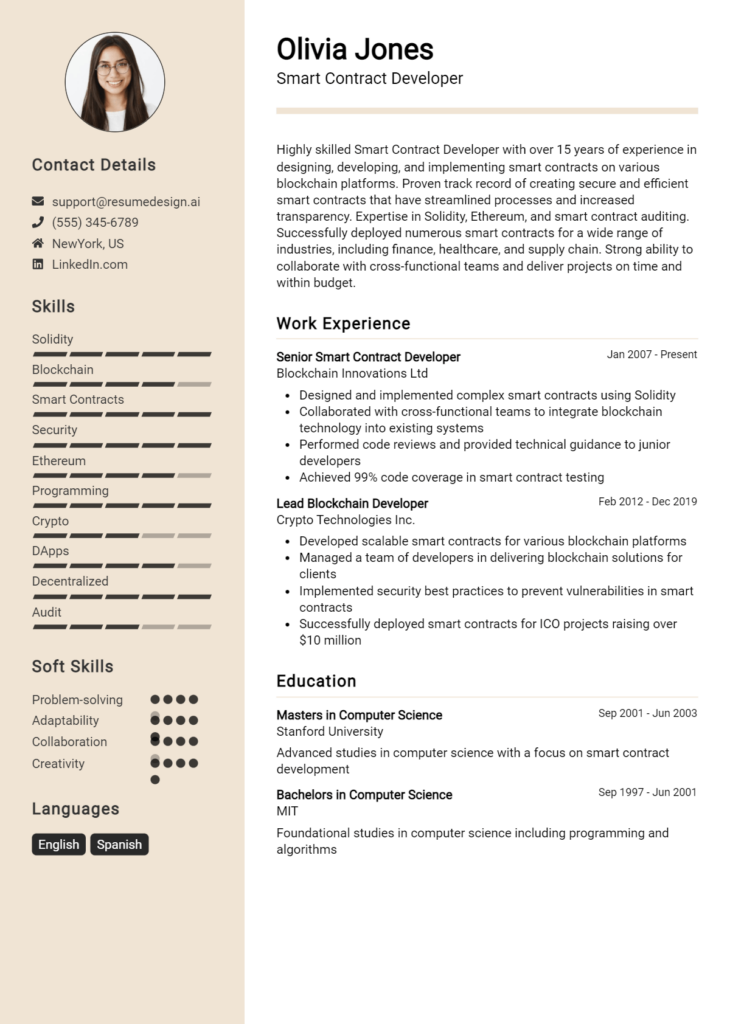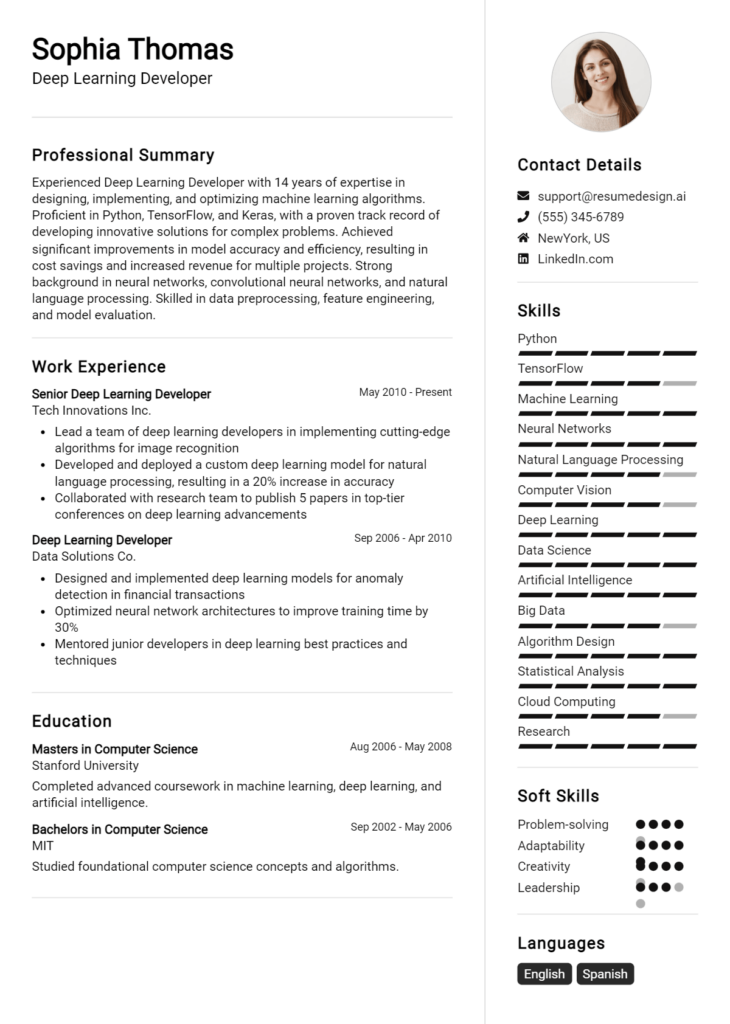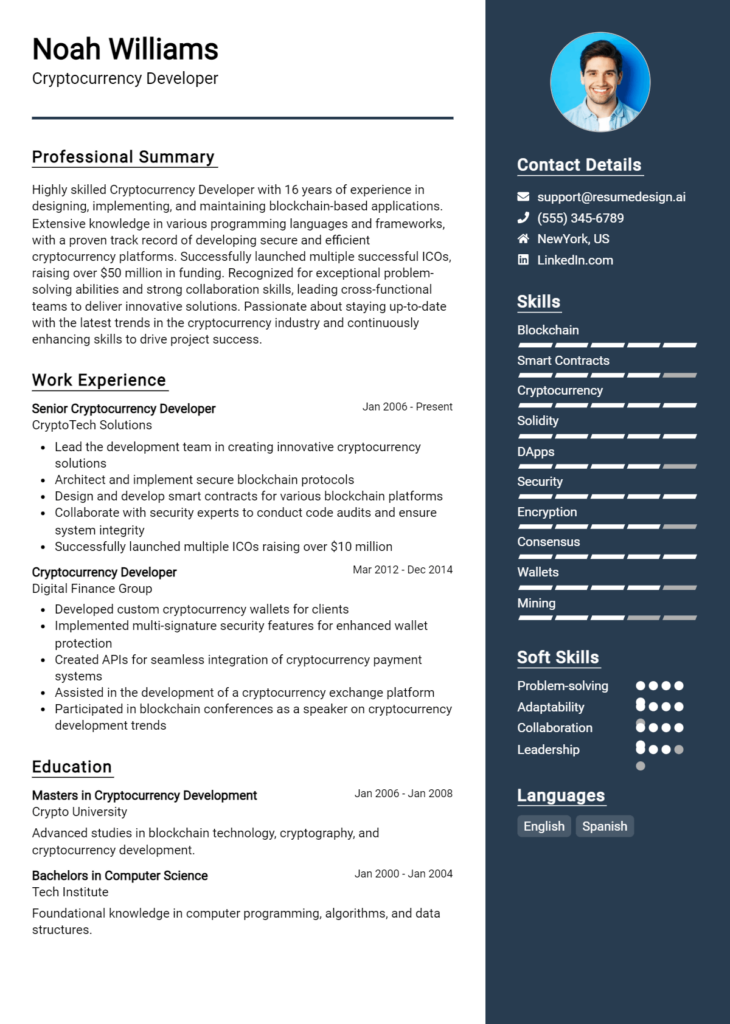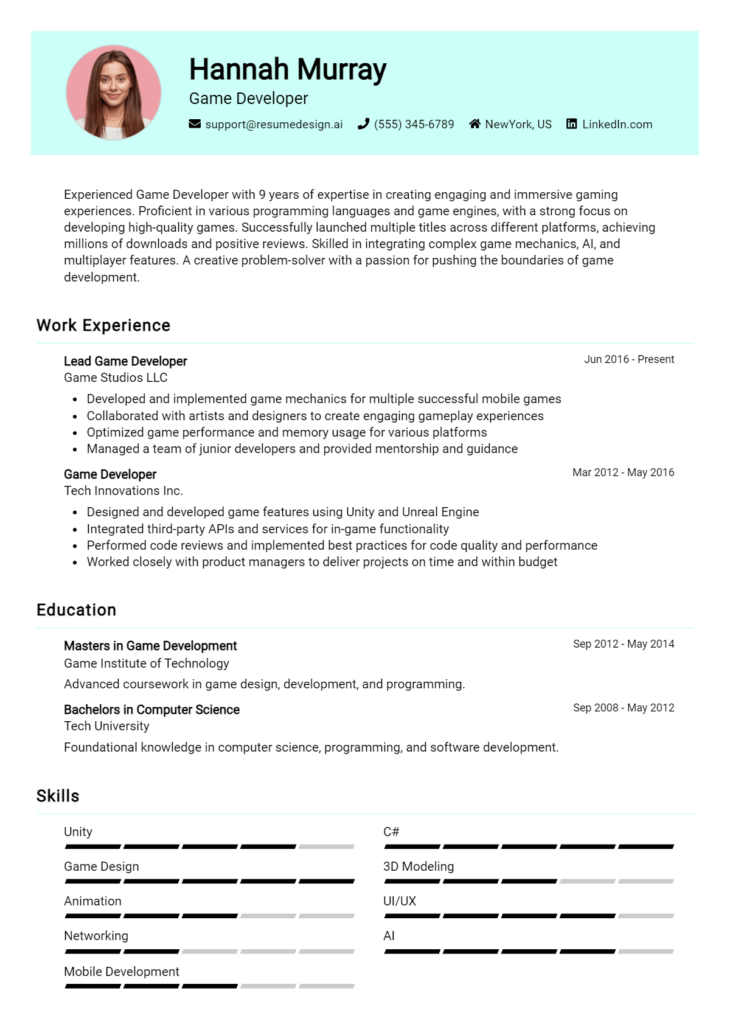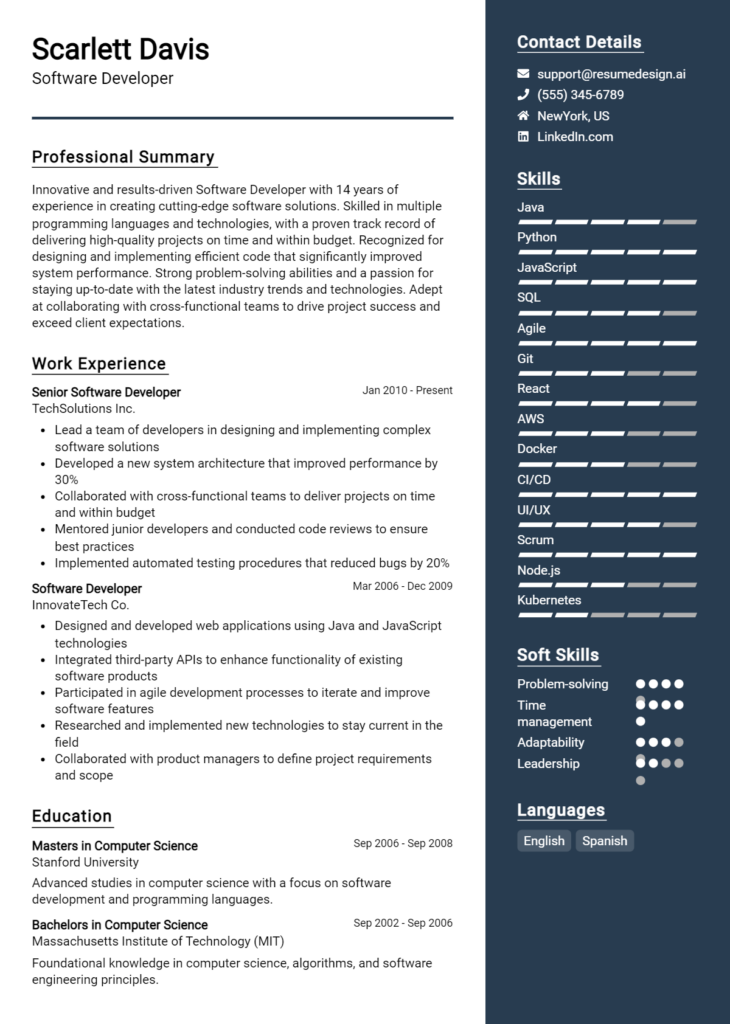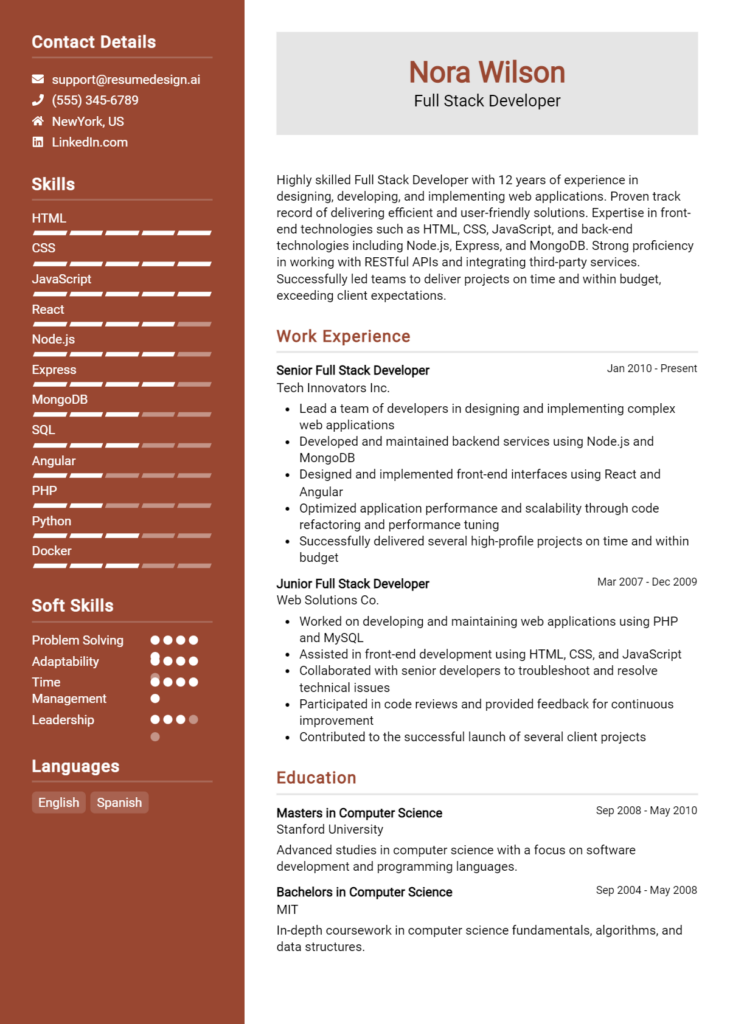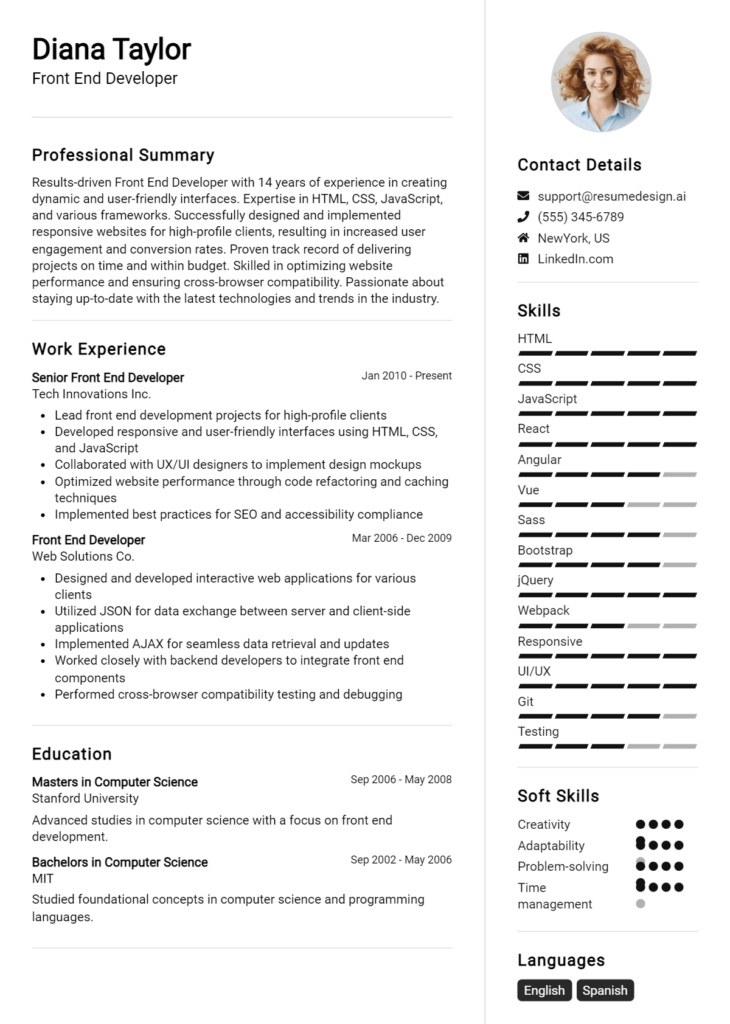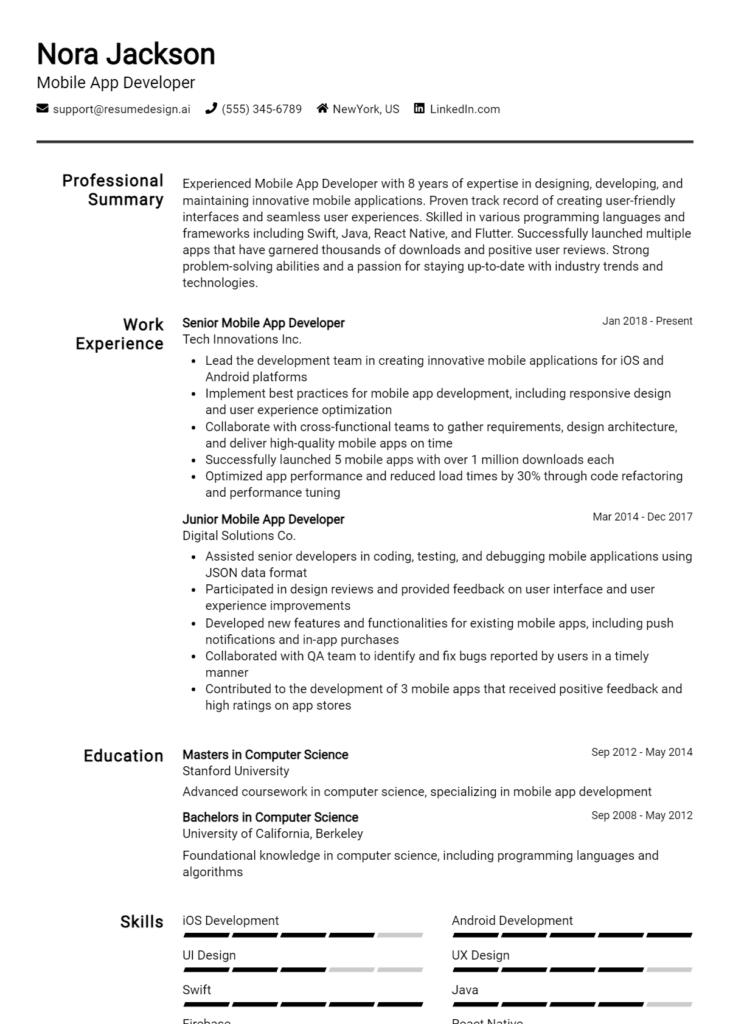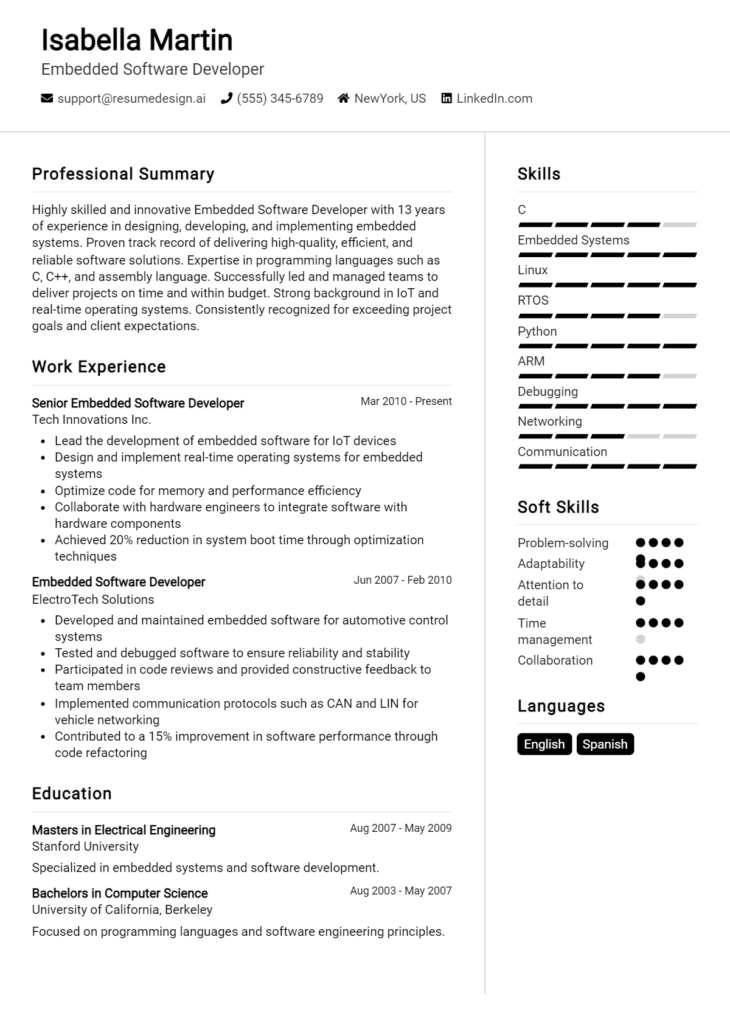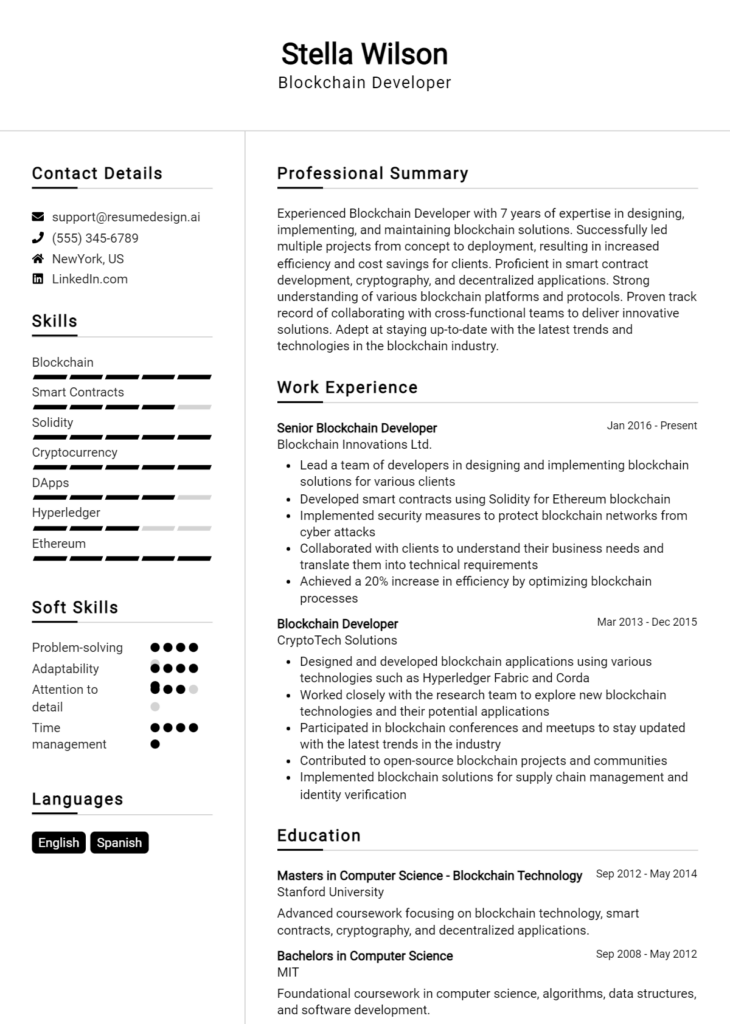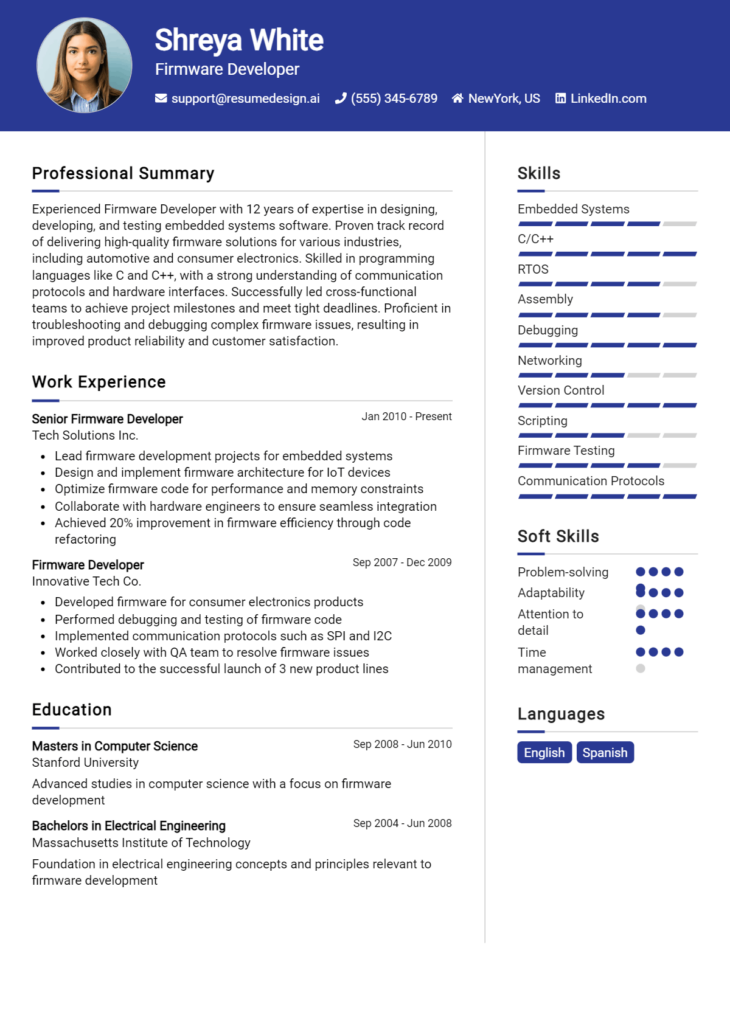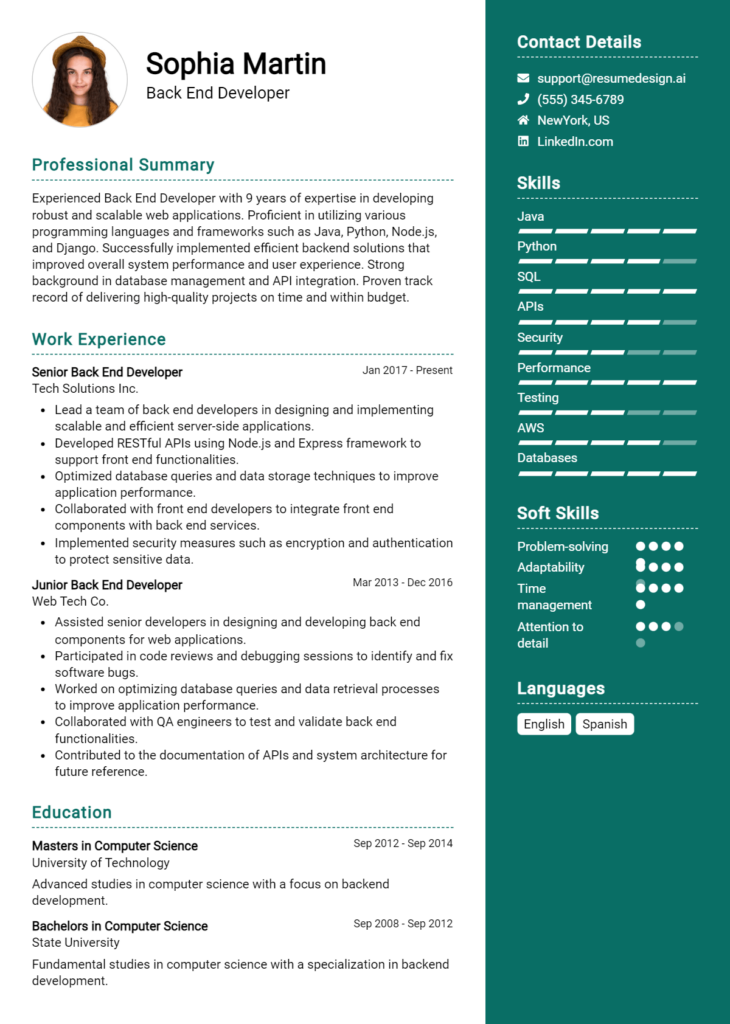Natural Language Processing Developer Core Responsibilities
A Natural Language Processing (NLP) Developer plays a critical role in bridging technical and operational functions within organizations. Their core responsibilities include designing and implementing NLP algorithms, analyzing and processing large datasets, and collaborating with cross-functional teams to enhance machine learning models. Essential skills encompass strong programming expertise, statistical analysis, and effective problem-solving abilities. These competencies not only drive innovation but also align with the organization's strategic goals, making a well-structured resume vital for showcasing these qualifications.
Common Responsibilities Listed on Natural Language Processing Developer Resume
- Develop and optimize NLP models for various applications.
- Analyze and preprocess text data to improve model performance.
- Collaborate with data scientists and software engineers on project requirements.
- Conduct research on new NLP techniques and technologies.
- Implement machine learning algorithms for text classification and sentiment analysis.
- Evaluate and fine-tune existing models for accuracy and efficiency.
- Create documentation and reports for technical processes and solutions.
- Participate in code reviews and contribute to team knowledge sharing.
- Integrate NLP solutions into existing software systems.
- Monitor system performance and troubleshoot issues as they arise.
- Stay updated with advancements in NLP and related fields.
High-Level Resume Tips for Natural Language Processing Developer Professionals
In the competitive field of Natural Language Processing (NLP), a well-crafted resume can be the key to unlocking career opportunities. For many candidates, the resume serves as the first impression they make on potential employers, and it is crucial that it effectively showcases both technical skills and accomplishments. A targeted resume not only reflects your qualifications but also demonstrates your understanding of the role and its requirements. This guide will provide practical and actionable resume tips specifically tailored for Natural Language Processing Developer professionals, helping you stand out in a crowded applicant pool.
Top Resume Tips for Natural Language Processing Developer Professionals
- Tailor your resume to the specific job description, aligning your skills and experiences with the key requirements listed by the employer.
- Showcase relevant experience by emphasizing projects and roles that involved NLP technologies, such as machine learning models, text mining, or sentiment analysis.
- Quantify your achievements where possible, using metrics to demonstrate the impact of your work, such as improved accuracy rates or reductions in processing time.
- Highlight industry-specific skills such as familiarity with NLP frameworks (e.g., TensorFlow, PyTorch, NLTK, or SpaCy) and programming languages (e.g., Python, Java, R).
- Include any relevant certifications or training that bolster your expertise in NLP and related fields.
- Utilize clear and concise language, avoiding jargon that may not be familiar to all hiring managers.
- Incorporate keywords from the job listing to pass through Applicant Tracking Systems (ATS) effectively.
- Present your resume in a clean, professional format that is easy to read and visually appealing.
- Consider adding a summary statement at the beginning of your resume that encapsulates your experience and passion for NLP.
- Keep your resume updated with the latest projects and emerging technologies in the field to demonstrate ongoing learning and adaptability.
By implementing these tips, you can significantly enhance your resume and increase your chances of landing a job in the Natural Language Processing Developer field. A meticulously crafted resume that highlights your relevant skills and achievements will not only grab the attention of potential employers but also position you as a strong candidate in a rapidly evolving industry.
Why Resume Headlines & Titles are Important for Natural Language Processing Developer
In the competitive field of Natural Language Processing (NLP), a well-crafted resume headline or title serves as a crucial first impression for candidates. It acts as a succinct summary of the applicant's key qualifications and expertise, instantly capturing the attention of hiring managers. A strong headline not only reflects the candidate's skills and experience in NLP but also positions them as a standout choice for the role. By being concise, relevant, and tailored to the specific job, these headlines can significantly enhance a resume's impact and increase the chances of landing an interview.
Best Practices for Crafting Resume Headlines for Natural Language Processing Developer
- Keep it concise: Limit the headline to one impactful sentence.
- Be role-specific: Tailor the headline to align with the job description.
- Highlight key skills: Include your most relevant technical skills in NLP.
- Showcase experience: Reference years of experience or notable projects.
- Use action words: Employ dynamic verbs to convey accomplishments.
- Incorporate keywords: Utilize industry-specific terms that align with the job.
- Avoid jargon: Keep the language clear and accessible.
- Focus on value: Emphasize what you can bring to the employer.
Example Resume Headlines for Natural Language Processing Developer
Strong Resume Headlines
"Experienced NLP Developer Specializing in Machine Learning and Text Analysis"
“Innovative Natural Language Processing Engineer with 5+ Years in AI-Powered Solutions”
“Data-Driven NLP Specialist with Proven Success in Developing Chatbot Technologies”
Weak Resume Headlines
“NLP Developer Looking for Opportunities”
“Skilled Programmer”
The strong headlines are effective because they immediately convey the candidate's specific expertise and accomplishments, making them memorable and relevant to hiring managers. They highlight the candidate’s key strengths in a way that aligns with the job requirements, giving a clear reason for further consideration. In contrast, the weak headlines fail to impress due to their vagueness and lack of specificity. These generic phrases do not provide any real insight into the candidate's qualifications, making it difficult for employers to see the value they could bring to the role.
Writing an Exceptional Natural Language Processing Developer Resume Summary
A resume summary is a crucial component for a Natural Language Processing (NLP) Developer, serving as a powerful first impression for hiring managers. In a competitive job market, a well-crafted summary can quickly capture attention by highlighting key skills, relevant experience, and notable accomplishments that align with the job role. A strong summary should be concise and impactful, tailored specifically to the job the candidate is applying for, ensuring it resonates with the employer’s needs and expectations.
Best Practices for Writing a Natural Language Processing Developer Resume Summary
- Quantify Achievements: Use specific numbers or metrics to demonstrate your impact in previous roles.
- Focus on Skills: Highlight key NLP skills, such as machine learning, data preprocessing, or language modeling.
- Tailor the Summary: Customize your summary for each job application to reflect the specific requirements listed in the job description.
- Be Concise: Keep your summary brief—ideally 3-5 sentences—that effectively communicates your qualifications.
- Showcase Relevant Experience: Mention specific projects or roles where you applied NLP techniques successfully.
- Use Industry Terminology: Incorporate relevant jargon and terminology to demonstrate your knowledge and familiarity with the field.
- Highlight Soft Skills: Don't forget to mention interpersonal skills like teamwork, communication, and problem-solving that can be crucial in collaborative environments.
- Maintain a Professional Tone: Keep the language formal and professional, reflecting the seriousness of the role you are applying for.
Example Natural Language Processing Developer Resume Summaries
Strong Resume Summaries
Results-driven NLP Developer with over 5 years of experience in designing and implementing machine learning algorithms, achieving a 30% increase in model accuracy for sentiment analysis applications.
Detail-oriented developer skilled in natural language processing and Python programming, demonstrated success in deploying chatbots that improved customer engagement by 40% within six months.
Innovative NLP specialist with a proven track record in deep learning and data mining, successfully led a team project that reduced processing time by 25% while enhancing data quality for language translation tools.
Proficient in using TensorFlow and NLTK to develop language models, contributed to a project that processed over 1 million text entries, leading to a 15% increase in product recommendation accuracy.
Weak Resume Summaries
I have experience in programming and working with languages like Python.
NLP Developer looking for a challenging position to apply my skills and help the company succeed.
The examples provided illustrate the distinctions between strong and weak resume summaries. Strong summaries are characterized by their specificity, quantifiable accomplishments, and relevance to the desired role, while weak summaries tend to be vague, generic, and lack measurable outcomes. By focusing on the key elements that make a summary compelling, candidates can significantly enhance their chances of making a positive impression on hiring managers.
Work Experience Section for Natural Language Processing Developer Resume
The work experience section of a Natural Language Processing Developer resume is critical in illustrating the candidate's technical capabilities and their experience in delivering high-quality products. This section not only showcases the applicant’s familiarity with NLP tools and techniques but also highlights their ability to manage teams and collaborate effectively within a development environment. By quantifying achievements – such as improvements in model accuracy, efficiency gains, or successful project completions – candidates can demonstrate their impact on previous organizations. Moreover, aligning work experience with industry standards is essential to resonate with hiring managers and stand out in a competitive job market.
Best Practices for Natural Language Processing Developer Work Experience
- Use specific metrics to quantify achievements, such as accuracy improvements, processing times, or user engagement increases.
- Highlight key NLP technologies and frameworks you have worked with, such as TensorFlow, PyTorch, or spaCy.
- Emphasize collaboration by detailing your role in team projects and your contributions to group success.
- Include relevant projects that demonstrate problem-solving skills and your ability to innovate within the NLP space.
- Tailor your experience to match job descriptions, focusing on skills and technologies mentioned in the postings.
- Showcase leadership experiences, such as mentoring junior developers or leading a project from inception to completion.
- Incorporate feedback or outcomes from stakeholders to validate the quality of your contributions.
- Keep descriptions concise while ensuring they communicate the significance of your contributions.
Example Work Experiences for Natural Language Processing Developer
Strong Experiences
- Led a team of 5 developers to create an NLP-based chatbot that improved customer query response times by 40%, enhancing user satisfaction ratings by 30%.
- Developed a sentiment analysis model that achieved 95% accuracy, resulting in actionable insights that increased marketing campaign effectiveness by 25%.
- Implemented a text summarization feature that reduced document processing time by 50%, saving the company an estimated $200,000 annually.
- Collaborated with cross-functional teams to deploy a language translation service, successfully increasing user engagement by 60% across multiple regions.
Weak Experiences
- Worked on various NLP projects to improve company processes.
- Participated in team meetings and contributed ideas.
- Assisted in developing machine learning models.
- Helped with data cleaning tasks for NLP applications.
The examples provided illustrate a stark contrast between strong and weak experiences. Strong experiences clearly define specific achievements, showcasing quantifiable outcomes and technical leadership, which are essential for a Natural Language Processing Developer role. In contrast, weak experiences lack detail and fail to highlight any significant contributions or results, making them less impactful to potential employers. By focusing on measurable successes and collaborative efforts, candidates can effectively demonstrate their qualifications and readiness for advanced roles in NLP development.
Education and Certifications Section for Natural Language Processing Developer Resume
The education and certifications section of a Natural Language Processing Developer resume is crucial as it serves to showcase the candidate's academic background and specialized training relevant to the field. This section not only highlights degrees and certifications obtained from recognized institutions but also emphasizes the candidate's commitment to continuous learning and professional development. Providing relevant coursework, certifications, and specialized training can significantly enhance the candidate's credibility, demonstrating their alignment with the job role and their preparedness to tackle the complexities of natural language processing tasks.
Best Practices for Natural Language Processing Developer Education and Certifications
- List degrees from accredited institutions relevant to computer science, linguistics, or artificial intelligence.
- Include industry-recognized certifications, such as those from Google, IBM, or specialized NLP courses.
- Highlight relevant coursework that directly relates to natural language processing, machine learning, and data analysis.
- Use specific titles for certifications and training programs to enhance clarity and recognition.
- Focus on recent educational achievements to demonstrate up-to-date knowledge and skills.
- Consider including online courses from reputable platforms that indicate ongoing learning efforts.
- Detail any research or projects completed during academic studies that pertain to NLP.
- Organize the section in reverse chronological order for a clear presentation of qualifications.
Example Education and Certifications for Natural Language Processing Developer
Strong Examples
- M.S. in Computer Science with a specialization in Natural Language Processing, Stanford University, 2022.
- Certified TensorFlow Developer, Google, 2023.
- Advanced Natural Language Processing Course, Coursera, 2021.
- B.S. in Linguistics with a focus on Computational Linguistics, University of California, Berkeley, 2020.
Weak Examples
- B.A. in Art History, University of Texas, 1998.
- Certification in Basic Microsoft Office, 2020.
- High School Diploma, 2005.
- Online Workshop in Creative Writing, 2021.
The strong examples are considered effective because they directly relate to the skills and knowledge necessary for a Natural Language Processing Developer, showcasing advanced degrees and recognized certifications that are relevant to the field. In contrast, the weak examples reflect qualifications that are outdated, irrelevant, or do not provide any substantial value in the context of a technical role in natural language processing, thereby failing to demonstrate the candidate's suitability for the position.
Top Skills & Keywords for Natural Language Processing Developer Resume
As the field of Natural Language Processing (NLP) continues to evolve, the importance of showcasing the right skills on a resume cannot be overstated. A well-crafted resume that highlights both hard and soft skills can significantly enhance a candidate's chances of landing a position in this competitive domain. Employers look for individuals who not only possess technical proficiency but also demonstrate the ability to collaborate, communicate, and innovate within a team setting. To effectively convey your suitability for the role, it's crucial to identify and articulate these skills clearly. For more insights into the essential skills and how to present your work experience, consider the following lists of hard and soft skills that are vital for a Natural Language Processing Developer.
Top Hard & Soft Skills for Natural Language Processing Developer
Hard Skills
- Proficiency in programming languages such as Python, Java, or R
- Experience with NLP libraries like NLTK, SpaCy, or Stanford NLP
- Knowledge of machine learning frameworks including TensorFlow and PyTorch
- Familiarity with data preprocessing techniques and text analytics
- Understanding of deep learning architectures for NLP tasks
- Skill in API development for language models
- Experience with cloud platforms (AWS, Google Cloud, Azure) for deploying NLP solutions
- Ability to work with databases and data manipulation (SQL, NoSQL)
- Knowledge of linguistics and language semantics
- Familiarity with version control systems like Git
- Understanding of chatbot development and conversational interfaces
- Experience with data visualization tools for presenting NLP results
Soft Skills
- Strong analytical and problem-solving abilities
- Excellent communication skills for conveying complex ideas
- Team collaboration and interpersonal skills
- Adaptability to rapidly changing technologies
- Critical thinking and innovative mindset
- Time management and organizational skills
- Attention to detail in coding and data analysis
- Ability to work independently and take initiative
- Empathy to understand user needs and improve user experience
- Willingness to learn and stay updated with industry trends
- Project management skills to oversee NLP projects
- Patience and perseverance in troubleshooting and debugging
- Creativity in developing unique NLP solutions
By emphasizing these essential skills, you can create a compelling resume that stands out to potential employers in the NLP field.
Stand Out with a Winning Natural Language Processing Developer Cover Letter
Dear [Hiring Manager's Name],
I am writing to express my interest in the Natural Language Processing Developer position at [Company Name], as advertised on [where you found the job listing]. With a strong background in computer science and a specialized focus on natural language processing (NLP), I am excited about the opportunity to contribute to innovative projects that enhance user experiences through advanced language models and machine learning algorithms. My hands-on experience with frameworks such as TensorFlow and PyTorch, along with my proficiency in Python and Java, positions me well to make a meaningful impact on your team.
In my previous role at [Previous Company Name], I successfully developed and deployed an NLP-based chatbot that improved customer engagement by 40%. This project involved not only designing the conversational flow but also implementing sentiment analysis and entity recognition features to create a seamless interaction experience. My ability to collaborate with cross-functional teams ensured that we met project deadlines and delivered high-quality solutions that exceeded client expectations. I am particularly drawn to [Company Name] because of its commitment to leveraging AI technology to solve real-world problems, and I am eager to bring my expertise in NLP to contribute to your mission.
Moreover, I am continually striving to stay at the forefront of NLP advancements by participating in workshops, contributing to open-source projects, and conducting independent research on emerging trends. I believe that my passion for language technologies and my analytical mindset will allow me to contribute fresh perspectives and innovative solutions to your team. I am excited about the possibility of working at [Company Name] and contributing to the development of groundbreaking NLP applications that can change the way people interact with technology.
Thank you for considering my application. I look forward to the opportunity to discuss how my skills and experiences align with the needs of your team. I am eager to bring my passion for natural language processing to [Company Name] and to help drive the success of your projects.
Sincerely,
[Your Name]
[Your LinkedIn Profile]
[Your Contact Information]
Common Mistakes to Avoid in a Natural Language Processing Developer Resume
When crafting a resume for a Natural Language Processing (NLP) Developer position, it's crucial to present your skills and experiences clearly and effectively. Many candidates fall into common traps that can undermine their chances of landing an interview. Avoiding these mistakes can help you create a more compelling and professional resume that showcases your qualifications in the competitive field of NLP.
Overloading with Technical Jargon: While it's important to demonstrate your technical knowledge, using too much jargon can alienate recruiters who may not be familiar with every term. Aim for clarity and conciseness.
Neglecting Soft Skills: Focusing solely on technical skills can make your resume one-dimensional. Highlighting soft skills, such as teamwork, communication, and problem-solving, is essential as they are crucial in collaborative environments.
Lack of Specificity in Experience: Vague descriptions of past roles can diminish the impact of your achievements. Be specific about your contributions, technologies used, and the results of your work to provide a clearer picture of your capabilities.
Ignoring Tailoring for the Job: Sending out the same resume for every application can be a missed opportunity. Tailoring your resume to align with the specific requirements and keywords from the job description can greatly enhance your chances.
Inconsistent Formatting: A cluttered or inconsistent format can distract from your achievements. Ensure that your resume is well-organized, with uniform fonts and headings, making it easy for recruiters to read.
Omitting Relevant Projects: Failing to include relevant projects, especially those showcasing your NLP skills, can weaken your application. Highlighting personal, academic, or freelance projects can demonstrate your practical experience and passion for the field.
Not Quantifying Achievements: Avoid making statements about your accomplishments without quantifying them. Use metrics or specific examples to illustrate the impact of your work, making your contributions more tangible.
Forgetting to Update Skills: As the field of NLP is rapidly evolving, not updating your skills section to reflect the latest technologies and frameworks can make your resume seem outdated. Regularly revisiting and refreshing your skills list is essential.
Conclusion
As we have explored the essential skills and qualifications for a Natural Language Processing Developer, it's crucial to ensure that your resume effectively highlights your expertise in this dynamic field. Key points to consider include your proficiency in programming languages such as Python or Java, experience with NLP libraries like NLTK or SpaCy, and familiarity with machine learning frameworks. Additionally, showcasing your ability to work with large datasets and understanding of linguistic nuances can set you apart from other candidates.
Now that you’re equipped with insights on what employers are looking for, it's time to take action. Review your resume and make sure it reflects your capabilities and achievements in natural language processing. To aid you in this process, consider utilizing helpful resources such as resume templates, a user-friendly resume builder, resume examples, and customizable cover letter templates. These tools can assist you in crafting a polished and professional presentation of your skills, maximizing your chances of landing that desired position in NLP. Take the next step towards advancing your career today!

